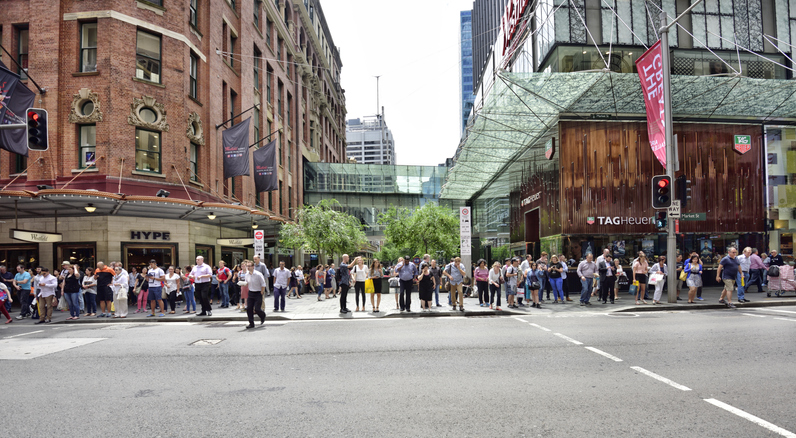Economy grows by 0.2 percent in September quarter
Households rein in spending but government expenditure goes up as cost-of-living rebates kick in
Australian gross domestic product (GDP) rose by 0.2 percent in the September quarter, taking the annual rate of economic growth to 2.1 percent, according to new figures from the Australian Bureau of Statistics (ABS). Katherine Keenan, ABS head of national accounts, said: “This was the eighth straight rise in quarterly GDP, but growth has slowed over 2023.”
Ms Kennan said the quarterly increase was due to a rise in government spending and investment while household spending remained flat. Government expenditure rose by 1.1 percent in the September quarter following an 0.6 percent rise in the June quarter.
“The growth in government expenditure was driven by social benefits to households, including the Energy Bill Relief Fund rebates, and extra payments for childcare, aged care and pharmaceutical products,” she said. The energy rebates had a big impact. The ABS said electricity prices rose by 4.2 percent during the quarter. Without the rebates, they would have risen 18.6 percent.
The Federal Government also spent more on defence, funding international training exercises held in Australia during the quarter. “National and state public corporations increased their capital investment by 8.9 percent, with boosted investment in transport, communication and utilities projects,” Ms Keenan said.
Wages including superannuation rose by 2.6 percent due to an increase in the super guarantee rate from 10 percent to 10.5 percent and a bump in the minimum wage alongside low unemployment. The wage price index rose 1.3 percent, which was the fastest quarterly rise on record. More jobs had wage movement and the average change in wages was significantly higher. The unemployment rate in the month of September was 3.6 percent.
Inflation rose by 1.2 percent during the September quarter, with the biggest contributors being higher petrol prices, rents, new dwelling purchases by owner-occupiers and electricity prices. Spending on fresh food fell 0.2 percent, alcohol purchases from bottle shops fell for the fifth consecutive quarter and gambling taxes fell 6.9 percent after a similar fall in the June quarter. Those who could afford it continued the post-COVID revenge travel trend. Travel services imports rose by 19.5 percent as more Australians headed overseas during the Northern Hemisphere summer. Travel exports grew 4.4 percent during the quarter due to the FIFA Women’s World Cup World Cup and a record level of international student enrolments.
Cost-of-living pressures fuelled by sticky inflation and high interest rates pushed the household saving-to-income ratio to its lowest level since 2007. The ratio fell for the eighth consecutive quarter, with Australians now only saving 1.1 percent of their incomes.
The impact of homeowners coming off fixed home loan rates was reflected in the 7.6 percent increase in interest paid by mortgagees over the quarter. The Reserve Bank did not raise the cash rate during the September quarter. Renters continued to do it tough, with rents now up 7.6 percent on an annual CPI basis, which is the largest annual increase since 2009. Australians also paid 7.6 percent more income tax due to the ending of the low and middle income tax offset.
This stylish family home combines a classic palette and finishes with a flexible floorplan
Just 55 minutes from Sydney, make this your creative getaway located in the majestic Hawkesbury region.
Continued stagflation and cost of living pressures are causing couples to think twice about starting a family, new data has revealed, with long term impacts expected
Australia is in the midst of a ‘baby recession’ with preliminary estimates showing the number of births in 2023 fell by more than four percent to the lowest level since 2006, according to KPMG. The consultancy firm says this reflects the impact of cost-of-living pressures on the feasibility of younger Australians starting a family.
KPMG estimates that 289,100 babies were born in 2023. This compares to 300,684 babies in 2022 and 309,996 in 2021, according to the Australian Bureau of Statistics (ABS). KPMG urban economist Terry Rawnsley said weak economic growth often leads to a reduced number of births. In 2023, ABS data shows gross domestic product (GDP) fell to 1.5 percent. Despite the population growing by 2.5 percent in 2023, GDP on a per capita basis went into negative territory, down one percent over the 12 months.
“Birth rates provide insight into long-term population growth as well as the current confidence of Australian families,” said Mr Rawnsley. “We haven’t seen such a sharp drop in births in Australia since the period of economic stagflation in the 1970s, which coincided with the initial widespread adoption of the contraceptive pill.”
Mr Rawnsley said many Australian couples delayed starting a family while the pandemic played out in 2020. The number of births fell from 305,832 in 2019 to 294,369 in 2020. Then in 2021, strong employment and vast amounts of stimulus money, along with high household savings due to lockdowns, gave couples better financial means to have a baby. This led to a rebound in births.
However, the re-opening of the global economy in 2022 led to soaring inflation. By the start of 2023, the Australian consumer price index (CPI) had risen to its highest level since 1990 at 7.8 percent per annum. By that stage, the Reserve Bank had already commenced an aggressive rate-hiking strategy to fight inflation and had raised the cash rate every month between May and December 2022.
Five more rate hikes during 2023 put further pressure on couples with mortgages and put the brakes on family formation. “This combination of the pandemic and rapid economic changes explains the spike and subsequent sharp decline in birth rates we have observed over the past four years,” Mr Rawnsley said.
The impact of high costs of living on couples’ decision to have a baby is highlighted in births data for the capital cities. KPMG estimates there were 60,860 births in Sydney in 2023, down 8.6 percent from 2019. There were 56,270 births in Melbourne, down 7.3 percent. In Perth, there were 25,020 births, down 6 percent, while in Brisbane there were 30,250 births, down 4.3 percent. Canberra was the only capital city where there was no fall in the number of births in 2023 compared to 2019.
“CPI growth in Canberra has been slightly subdued compared to that in other major cities, and the economic outlook has remained strong,” Mr Rawnsley said. “This means families have not been hurting as much as those in other capital cities, and in turn, we’ve seen a stabilisation of births in the ACT.”
This stylish family home combines a classic palette and finishes with a flexible floorplan
Just 55 minutes from Sydney, make this your creative getaway located in the majestic Hawkesbury region.


















